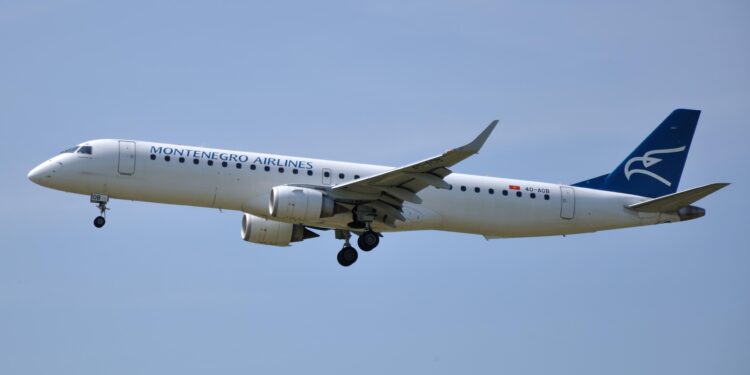Air Montenegro’s expansion plans have hit an unexpected snag as paperwork issues surrounding component traceability have delayed the delivery of the airline’s third Embraer E195 aircraft. The carrier, poised to strengthen its regional fleet, now faces regulatory hurdles that underscore the critical importance of stringent documentation in the aviation industry. This setback not only stalls Air Montenegro’s growth trajectory but also highlights ongoing challenges airlines encounter in aircraft certification and compliance processes.
Paperwork Issues Delay Air Montenegro’s Expansion with Third Embraer E195
Air Montenegro faces unexpected setbacks in its fleet expansion as regulatory paperwork surrounding the third Embraer E195 has encountered delays. The primary obstacle lies in component traceability documentation, which is critical for aircraft certification and delivery. Authorities require thorough verification of each part’s origin and maintenance history to comply with stringent safety standards. This procedural hiccup means the planned integration of the new jet into Air Montenegro’s network must be postponed until all documentation issues are resolved, impacting the airline’s growth strategy and operational timetable.
Industry insiders suggest that these challenges highlight the complexity of managing modern fleet expansions, especially when sourcing aircraft components from multiple suppliers. The paperwork gaps mostly revolve around the following:
- Incomplete serial number records
- Lack of verifiable maintenance logs
- Delays in cross-border documentation transfer
Below is a simplified overview of the affected components and their traceability status:
| Component | Traceability Status | Expected Resolution |
|---|---|---|
| Avionics Suite | Pending documentation | 2 weeks |
| Engine Accessories | Under audit | 3 weeks |
| Landing Gear Assemblies | Complete | Immediate clearance |
Component Traceability Challenges Impede Fleet Growth and Operational Efficiency
Air Montenegro’s ambition to expand its fleet with a third Embraer E195 has been significantly delayed due to persistent challenges related to component traceability. Regulatory authorities have raised concerns over incomplete documentation and verification records for critical aircraft parts, halting the commissioning process. This obstacle highlights a growing industry-wide issue where insufficient tracking inhibits not only aircraft certification but also long-term operational reliability. Airlines are increasingly confronted with stringent requirements to validate each component’s provenance to meet safety and compliance standards.
Such traceability gaps create a ripple effect across fleet management and maintenance schedules, ultimately impacting airline growth and efficiency. Airlines must now invest more resources into:
- Comprehensive record-keeping systems to ensure seamless documentation
- Supplier audits to verify parts sourcing and history
- Enhanced digital tracking technologies that improve transparency
Without these improvements, operational setbacks like Air Montenegro’s experience may become commonplace, stalling fleet expansion and increasing operational costs in a highly competitive market.
| Impact Area | Challenge | Consequence |
|---|---|---|
| Fleet Growth | Document Gaps | Delivery delays |
| Maintenance | Unverified Parts | Extended downtimes |
| Regulatory Compliance | Traceability Issues | Certification risks |
Improving Documentation Practices Key to Avoid Future Delivery Setbacks at Air Montenegro
Air Montenegro’s recent delay in accepting the third Embraer E195 highlights a critical area needing urgent attention: the airline’s documentation and component traceability protocols. The setback arose due to incomplete paperwork related to key aircraft components, underscoring the importance of precise record-keeping in aviation deliveries. Industry experts stress that maintaining comprehensive and transparent documentation isn’t just administrative-it directly impacts fleet operational readiness and regulatory compliance. Without rigorous traceability, airlines risk operational disruptions that can cascade into financial losses and reputation damage.
To mitigate similar future risks, Air Montenegro’s aviation team is now prioritizing the enhancement of its document management practices. Key measures include:
- Digitization of component records to streamline updates and retrieval;
- Cross-departmental audits to verify data accuracy before aircraft acceptance;
- Regular training programs emphasizing the importance of traceability standards.
These steps are aimed at creating a robust framework that supports timely and compliant aircraft deliveries – a necessity in today’s highly regulated aviation environment.
| Documentation Aspect | Current Challenges | Proposed Improvements |
|---|---|---|
| Component Traceability | Incomplete serial number logs | Centralized digital tracking system |
| Paperwork Validation | Manual verification errors | Automated cross-check software |
| Staff Training | Inconsistent knowledge of regulatory standards | Periodic compliance workshops |
Key Takeaways
As Air Montenegro continues to navigate the complexities of component traceability and regulatory compliance, the delay in deploying its third Embraer E195 underscores the broader challenges facing regional airlines in fleet expansion. Industry observers will be watching closely to see how swiftly the carrier resolves these paperwork hurdles, which are critical not only for operational efficiency but also for maintaining safety standards. The resolution of these issues will be pivotal in determining Air Montenegro’s ability to strengthen its market position amid an increasingly competitive aviation landscape.
















